-
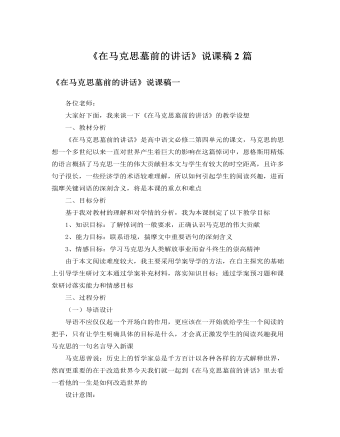
人教版高中语文必修2《在马克思墓前的讲话》说课稿2篇
(二)、课前检测:1.课文从哪几方面介绍马克思的伟大贡献?具体介绍一下有哪些伟大贡献?2.概述课文的结构。此项设置主要是让学生熟悉课文,为下文揣摩语言打基础。“温故知新”。(三)、新课讲授:1.先引导学生完成一些语句的揣摩理解,然后师生共同归纳揣摩重点语句的方法。问题1:为什么说马克思“停止思想”“安静地睡着了”“永远地睡着了”?问题2:讳饰修辞手法的运用有什么作用?答案:表达了作者对马克思的哀悼与尊敬以及不忍再说,而又不得不说的沉痛心情。以上两个问题重在引导学生从重点句段入手揣摩语言。问题3:第三段是一个复杂的单句,它的句子主干是什么?冒号后面作为宾语的复指成分可以分为哪几层意思?“正像达尔文……一样”在句子中是什么成分?起什么作用?
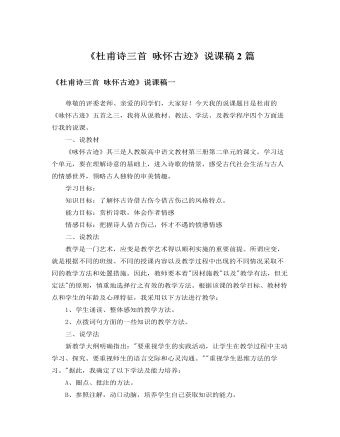
人教版高中语文必修3《杜甫诗三首 咏怀古迹》说课稿2篇
第三,说教学重点和难点。根据课程标准的具体要求、学生实际和社会实际以及教材的逻辑结构和教学体系,我认为本课的重难点是以下几个方面。教学重点:1.理解王昭君的形象2.深入理解杜甫在诗中的情感教学难点:理解寓意,把握主旨。第四,说教法与学法。教法:根据课文特点和学生实际情况,以诵读法(示范朗读、学生齐读)、问题探究法、点拨法、讨论分析法进行教学。首先激发学生学习本文的兴趣;然后引导学生反复吟哦诵读,在读的过程中质疑、思考、品析、鉴赏;最后在教师适当的点拨下,在集体的热烈讨论中,理解作者的感情,得到新的认识。(解说:使学生在教师的主导下围绕中心议题发表各自的意见,相互交流,相互启发,相互争议,激发他们主动去获取知识,培养健康情感。)
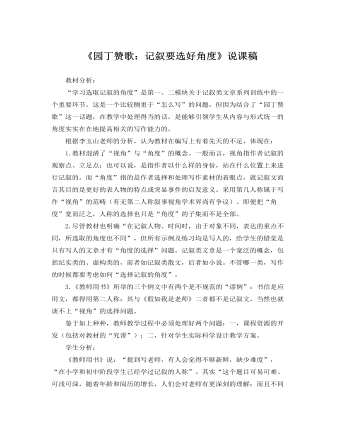
人教版高中语文必修1《园丁赞歌:记叙要选好角度》说课稿
在学习语文经验交流会上,季老师举着我的《采花酿蜜集》,对大家说:“人日积月累辛勤采撷,终于酿出了知识的琼浆。大家都应这样,争做知识的富户啊!”老师有点激动,低低地爬在鼻梁上的眼镜突然滑了下来,正好落在那集子上。大家笑了,季老师也笑了。就这样,我的写作有了进步,好几篇作文登上了班级《学作园地》。从此,我爱上了语文,更深深地爱上了季老师。高中升学考前那个星期天的夜晚,季老师旧病复发,累倒了。半夜,老师们把他送进了公社卫生院。第二天,同学们都悄悄去卫生院看望。我去的时候,季老师正在挂滴流。可是,下午季老师又出现在讲台上,他脸色憔悴,声音沙哑……我手捧《采花酿蜜集》走近季老师,思绪的溪水从远方流了回来。“季老师”,我把本子捧给老师,深情地叫了声。季老师接过本子,仔细翻阅着,脸上露出了笑容,像是闻到了郁郁芳香的蜜汁似的。“进步不小呀!”季老师说着,又在本子扉页上题了
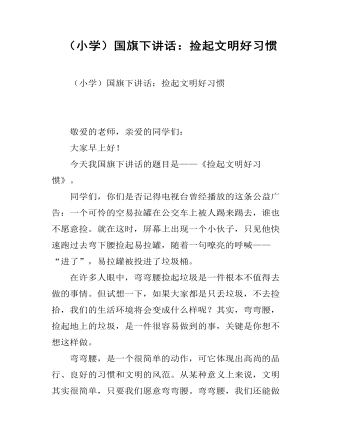
(小学)国旗下讲话:捡起文明好习惯
同学们,你们是否记得电视台曾经播放的这条公益广告:一个可怜的空易拉罐在公交车上被人踢来踢去,谁也不愿意捡。就在这时,屏幕上出现一个小伙子,只见他快速跑过去弯下腰捡起易拉罐,随着一句嘹亮的呼喊——“进了”,易拉罐被投进了垃圾桶。在许多人眼中,弯弯腰捡起垃圾是一件根本不值得去做的事情。但试想一下,如果大家都是只丢垃圾,不去捡拾,我们的生活环境将会变成什么样呢?其实,弯弯腰,捡起地上的垃圾,是一件很容易做到的事,关键是你想不想这样做。弯弯腰,是一个很简单的动作,可它体现出高尚的品行、良好的习惯和文明的风范。从某种意义上来说,文明其实很简单,只要我们愿意弯弯腰。弯弯腰,我们还能做许多事:弯弯腰,随手捡起同学掉下的铅笔;弯弯腰,鞠躬向老师问声好;弯弯腰,扶起摔倒的小同学
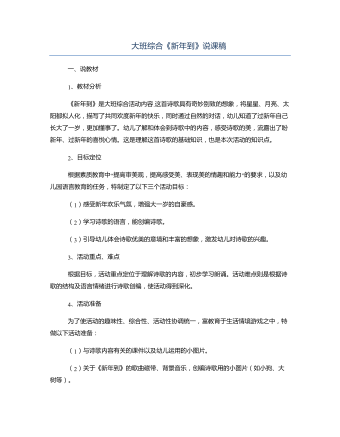
大班综合《新年到》说课稿
《新年到》是大班综合活动内容.这首诗歌具有奇妙别致的想象,将星星、月亮、太阳都拟人化,描写了共同欢度新年的快乐,同时通过自然的对话,幼儿知道了过新年自己长大了一岁,更加懂事了。幼儿了解和体会到诗歌中的内容,感受诗歌的美,流露出了盼新年、过新年的喜悦心情。这是理解这首诗歌的基础知识,也是本次活动的知识点。根据素质教育中“提高审美观,提高感受美、表现美的情趣和能力”的要求,以及幼儿园语言教育的任务,特制定了以下三个活动目标:(1)感受新年欢乐气氛,增强大一岁的自豪感。(2)学习诗歌的语言,能创编诗歌。(3)引导幼儿体会诗歌优美的意境和丰富的想象,激发幼儿对诗歌的兴趣。
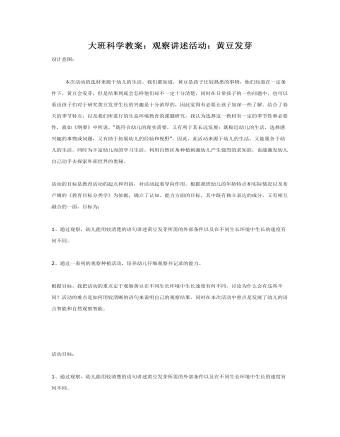
大班科学教案:观察讲述活动:黄豆发芽
活动的目标是教育活动的起点和归宿,对活动起着导向作用。根据我班幼儿的年龄特点和实际情况以及布卢姆的《教育目标分类学》为依据,确立了认知、能力方面的目标,其中既有独立表达的成分,又有相互融合的一面,目标为:1、通过观察,幼儿能用较清楚的语句讲述黄豆发芽所需的外部条件以及在不同生长环境中生长的速度有何不同。2、通过一系列的观察种植活动,培养幼儿仔细观察并记录的能力。根据目标,我把活动的重点定于观察黄豆在不同生长环境中生长速度有何不同,讨论为什么会有这些不同?活动的难点是如何用较清晰的语句来说明自己的观察结果。同时在本次活动中重点是发展了幼儿的语言智能和自然观察智能。活动目标:1、通过观察,幼儿能用较清楚的语句讲述黄豆发芽所需的外部条件以及在不同生长环境中生长的速度有何不同。2、通过一系列的观察种植活动,培养幼儿仔细观察并记录的能力。活动准备:1、知识准备:幼儿已经认识了空气,知道空气无处不在,月球上没有空气,万物就不能生长。2、实验准备:幼儿已经初步观察过在一般情况下黄豆的发芽情况;准备好在不同环境(水、沙、土)中已经发芽的黄豆以供幼儿观察。活动流程及环节:提出问题——进一步延伸问题——观察讨论——引出新问题、新实验一、提出问题:1、师提出问题:小朋友,前一段时间我们进行了黄豆发芽的实验,谁来告诉我,怎样才能使黄豆发芽?你看到的黄豆是怎样发芽的?先长什么?再长什么?颜色有些什么变化?
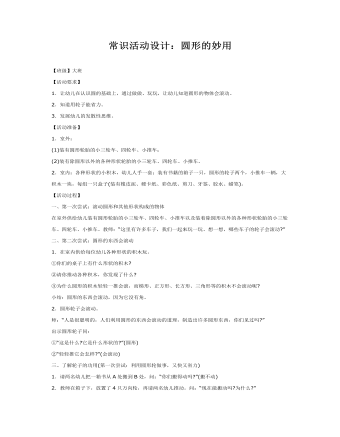
大班科学教案:常识活动设计:圆形的妙用
1.让幼儿在认识圆的基础上,通过做做、玩玩,让幼儿知道圆形的物体会滚动。2.知道用轮子能省力。3.发展幼儿的发散性思维。【活动准备】1.室外:(1)装有圆形轮胎的小三轮车、四轮车、小推车;(2)装有除圆形以外的各种形状轮胎的小三轮车、四轮车、小推车。2.室内:各种形状的小积木,幼儿人手一套;装有书籍的箱子一只,圆形的轮子两个,小推车一辆,大积木一块,每组一只盒子(装有橡皮泥、硬卡纸、彩色纸、剪刀、牙签、胶水、蜡笔)。【活动过程】一、第一次尝试:滚动圆形和其他形状构成的物体在室外供给幼儿装有圆形轮胎的小三轮车、四轮车、小推车以及装着除圆形以外的各种形状轮胎的小三轮车、四轮车、小推车。教师:“这里有许多车子,我们一起来玩一玩、想一想,哪些车子的轮子会滚动?”二、第二次尝试:圆形的东西会滚动1.在室内供给每位幼儿各种形状的积木玩。①你们的桌子上有什么形状的积木?②请你推动各种积木,你发现了什么?③为什么圆形的积木轻轻一推会滚,而梯形、正方形、长方形、三角形等的积木不会滚动呢?小结:圆形的东西会滚动,因为它没有角。
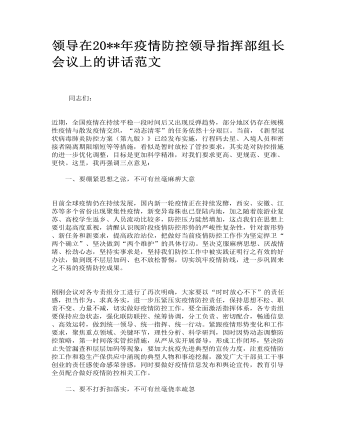
领导在疫情防控领导指挥部组长会议上的讲话范文
一、要绷紧思想之弦,不可有丝毫麻痹大意 目前全球疫情仍在持续发展,国内新一轮疫情正在持续发酵,西安、安徽、江苏等多个省份出现聚集性疫情,新变异毒株也已登陆内地,加之随着旅游业复苏、高校学生返乡、人员流动比较多,防控压力陡然增加,这点我们在思想上要引起高度重视,清醒认识现阶段疫情防控形势的严峻性复杂性,针对新形势、新任务和新要求,提高政治站位,把做好当前疫情防控工作作为坚定捍卫“两个确立”、坚决做到“两个维护”的具体行动。坚决克服麻痹思想、厌战情绪、松劲心态,坚持实事求是,坚持我们防控工作中被实践证明行之有效的好办法,做到既不层层加码、也不放松警惕,切实筑牢疫情防线,进一步巩固来之不易的疫情防控成果。 刚刚会议对各专责组分工进行了再次明确,大家要以“时时放心不下”的责任感,担当作为、求真务实,进一步压紧压实疫情防控责任,保持思想不松、职责不变、力量不减,切实做好疫情防控工作。要全面激活指挥体系,各专责组要保持应急状态,强化联防联控、统筹协调,分工负责、密切配合,畅通信息、高效运转,做到统一领导、统一指挥、统一行动。紧跟疫情形势变化和工作要求,聚焦重点领域、关键环节,理性分析、科学研判,因时因势动态调整防控策略,第一时间落实管控措施,从严从实开展督导,形成工作闭环,坚决防止失管漏查和层层加码等现象;要加大抗疫先进典型的宣传力度,注重疫情防控工作和稳生产保供应中涌现的典型人物和事迹挖掘,激发广大干部员工干事创业的责任感使命感荣誉感,同时要做好疫情信息发布和舆论宣传,教育引导全员配合做好疫情防控相关工作。

新人教版高中英语必修3Unit 4 Space Exploration-Listening&Speaking&Talking教学设计一
Listening and Speaking introduces the topic of “talking about how to become an astronaut”. This period is aimed to inform students some details about the requirements of being an astronaut. Students can be motivated and inspired by the astronauts. Teachers ought to encourage students to learn from them and let them aim high and dream big.Listening and Talking introduces the theme of "talk about life in space". This part also informs students more details about life in space and can inspire students to be curious about this job. 1. Guide students to listen for numbers concerning dates, years and ages etc2. Cultivate students' ability to talk about how to become an astronaut and life in space ; 3. Instruct students to use functional sentences of the dialogue such as “ first of all, I am not sure, so what might be .. I guess.. I wonder…I am curious…)appropriately.1. Guide students to understand the content of listening texts in terms of the whole and key details; 2. Cultivate students' ability to guess the meaning of words in listening; discuss with their peers how to become a qualified astronaut and describe the life in space.Part 1: Listening and SpeakingStep 1: Lead inPredictionThe teacher can ask students to predict what the listening text is about by looking at the pictures.About how to become an astronaut./the requirements of an astronautStep 2: Then, play the radio which is about an interview a. And after finishing listening for the first time, the students need to solve the following tasks.

新人教版高中英语选修2Unit 1 Science and Scientists-Learning about Language教学设计
Step 7: complete the discourse according to the grammar rules.Cholera used to be one of the most 1.__________ (fear) diseases in the world. In the early 19th century, _2_________ an outbreak of cholera hit Europe, millions of people died. But neither its cause, 3__________ its cure was understood. A British doctor, John Snow, wanted to solve the problem and he knew that cholera would not be controlled _4_________ its cause was found. In general, there were two contradictory theories 5 __________ explained how cholera spread. The first suggested that bad air caused the disease. The second was that cholera was caused by an _6_________(infect) from germs in food or water. John Snow thought that the second theory was correct but he needed proof. So when another outbreak of cholera hit London in 1854, he began to investigate. Later, with all the evidence he _7_________ (gather), John Snow was able to announce that the pump water carried cholera germs. Therefore, he had the handle of the pump _8_________ (remove) so that it couldn't be used. Through his intervention,the disease was stopped in its tracks. What is more, John Snow found that some companies sold water from the River Thames that __9__________________ (pollute) by raw waste. The people who drank this water were much more likely _10_________ (get) cholera than those who drank pure or boiled water. Through John Snow's efforts, the _11_________ (threaten) of cholera around the world saw a substantial increase. Keys: 1.feared 2.when 3. nor 4.unless 5.that/which 6.infection 7.had gathered 8.removed 9.was polluted 10.to get 11. threat

新人教版高中英语选修2Unit 1 Science and Scientists-Using langauge教学设计
This happens because the dish soap molecules have a strong negative charge, and the milk molecules have a strong positive charge. Like magnets, these molecules are attracted to each other, and so they appear to move around on the plate, taking the food coloring with them, making it look like the colors are quickly moving to escape from the soap.Listening text:? Judy: Oh, I'm so sorry that you were ill and couldn't come with us on our field trip. How are you feeling now? Better?? Bill: Much better, thanks. But how was it?? Judy: Wonderful! I especially liked an area of the museum called Light Games.it was really cool. They had a hall of mirrors where I could see myself reflected thousands of times!? Bill: A hall of mirrors can be a lot of fun. What else did they have?? Judy: Well, they had an experiment where we looked at a blue screen for a while, and then suddenly we could see tiny bright lights moving around on it. You'll never guess what those bright lights were!? Bill: Come on, tell me!? Judy: They were our own blood cells. For some reason, our eyes play tricks on us when we look at a blue screen, and we can see our own blood cells moving around like little lights! But there was another thing I liked better. I stood in front of a white light, and it cast different shadows of me in every color of the rainbow!? Bill: Oh, I wish I had been there. Tell me more!? Judy: Well, they had another area for sound. They had a giant piano keyboard that you could use your feet to play. But then, instead of playing the sounds of a piano, it played the voices of classical singers! Then they had a giant dish, and when you spoke into it, it reflected the sound back and made it louder. You could use it to speak in a whisper to someone 17 meters away.? Bill: It all sounds so cool. I wish I could have gone with you? Judy: I know, but we can go together this weekend. I'd love to go there again!? Bill: That sounds like a great idea!

新人教版高中英语选修2Unit 3 Food and Culture-Reading and thinking教学设计
The discourse explores the link between food and culture from a foreign’s perspective and it records some authentic Chinese food and illustrates the cultural meaning, gerography features and historic tradition that the food reflects. It is aimed to lead students to understand and think about the connection between food and culture. While teaching, the teacher should instruct students to find out the writing order and the writer’s experieces and feelings towards Chinese food and culture.1.Guide the students to read the text, sort out the information and dig out the topic.2.Understand the cultural connotation, regional characteristics and historical tradition of Chinese cuisine3.Understand and explore the relationship between food and people's personality4.Guide the students to use the cohesive words in the text5.Lead students to accurately grasp the real meaning of the information and improve the overall understanding ability by understanding the implied meaning behind the text.1. Enable the Ss to understand the structure and the writing style of the passage well.2. Lead the Ss to understand and think further about the connection between food and geography and local character traits.Step1: Prediction before reading. Before you read, look at the title, and the picture. What do you think this article is about?keys:It is about various culture and cuisine about a place or some countries.

新人教版高中英语必修3Unit 1 Festivals and celebrations-Discovering Useful Structure教学设计
4.That was an experience that frightened everyone. →That was _____________________. 答案:1. taking 2. being discussed 3. in the reading room 4. a frightening experienceStep 6 The meaning and function of V-ing as the predicative动词-ing形式作表语,它通常位于系动词后面,用以说明主语“是什么”或“怎么样”一种表示主语的特质、特征和状态, 其作用相当于形容词; 另一种具体说明主语的内容, 即主语等同于表语, 两者可互换。The music they are playing sounds so exciting. 他们演奏的音乐听起来令人激动。The result is disappointing. 结果令人失望。Our job is playing all kinds of music. 我们的工作就是演奏各种音乐。Seeing is believing. 眼见为实。Step 7 Practice1. It is ________(amaze) that the boy is able to solve the problem so quickly.2. Buying a car is simply _______(waste) money. 3. Please stop making the noise—it’s getting ________(annoy). 4. complete the passage with the appropriate -ing form.La Tomatina is a festival that takes place in the Spanish town Bunol every August. I think many food festivals are __________ because people are just eating. however, this festival is _________ because people don't actually eat the tomatoes. Instead, they throw them at each other! the number of people ________ part in this tomato fight, can reach up to 20,000, and it is a very __________ fight that lasts for a whole hour. The _______ thing is how clean Bunol is after the tomatoes are washed away after the fight. this is because the juice form tomatoes is really good for making surfaces clean!答案:1. amazing 2. wasting 3. annoying4. boring interesting taking exciting amazing

新人教版高中英语必修3Unit 1 Festivals and Celebrations-Reading and Thinking教学设计
The topic of this part is “Discover the reasons for festivals and celebrations.The Listening & Speaking & Talking part aims at talking about the experiences and feelings or emotions about the festivals and celebrations. This section aims at detecting the reason why the people celebrate the festivals, the time, the places, the types and the way of celebrations. It also explains why some traditions in the old celebrations are disappearing, like the firecrackers in the big cities and some new things are appearing like the prosperity of business or commerce. 1. Students can talk about what festivals they know and the reasons and the way of celebrating them.2. Students should learn the reading skills such as the headline and get the topic sentences, the structures of articles.3. Students can understand the past, the present situation of some festival around the world and why there are some changes about them. 4. Students can have the international awareness about the festivals.1. Students should learn the reading skills such as the headline and get the topic sentences, the structures of articles.2. Students can understand the past, the present situation of some festival around the world and why there are some changes about them.Step 1 Lead in---Small talkWhat festival do you like best ? Why ?I like the Spring Festivals because I can set off the fireworks, receive the lucky money and enjoy the Gala with my families.Step 2 Before reading---Pair workWhy do people celebrate different festivals ?The Spring Festivals is to celebrate the end of winter and the coming of spring and new life.The Mid-autumn Day is to celebrate the harvest and admire the moon.

新人教版高中英语必修3Unit 1 Festivals and Celebrations-Listening &Speaking&Talking教学设计
The theme of this section is “Talk about festival activities and festival experiences”.Festival and holiday is a relaxing and interesting topic for students. This part talks about the topic from the daily life of students’. In the part A ---Listening and Speaking, there are three conversations among different speakers from three countries(Japan, Rio and China), where the speakers are participating in or going to participate in the festivals and celebrations. So listening for the relationship among them is a fundamental task. Actually, with the globalization and more international communication, it is normal for Chinese or foreigners to witness different festivals and celebrations in or out of China. In the Conversation 1, a foreign reporter is interviewing a Japanese young girl who just had participated in the ceremony of the Coming-of-Age Day on the street and asking her feeling about the ceremony and the afterwards activities. Conversation 2, Chinese girl Li Mei is witnessing the Rio Carnival for the first time, and her friend Carla gives her some advice on the costumes which enables her to match with the carnival to have a good time. Conversation 3, a Chinese guide is showing a group of foreign visitors around the Lantern Festival and introducing the customs of the festival to them. The three conversations have a strong vitality and insert the festival and cultural elements from different countries. So perceiving the festivals and cultures from different countries is the second task. At the same time, the scripts also insert the targeted grammar --- v-ing as attributive and predicative, which students can perceive and experience in a real context and make a road for the further study. That is the third task. In the Part B--- Listening and Talking, the theme is “Talk about festival experience”, which is the common topic in our daily conversations. During the conversation, Song Lin, a Chinese student, asked Canadian friend Max about how to spend Christmas. In the conversation, Song Lin talked about experience and the feelings during the Chinese Spring Festival, during which there are not only some enjoyable things but some unpleasant things. After the listening, perhaps students find there are some similarities between Christmas and the Chinese Spring Festival as there are some differences in the origins and celebrations. For example, people always visit friends and relatives, decorate their houses, have a big dinner together, chat and give presents to each other.

新人教版高中英语必修3Unit 1 Festivals and Celebrations-Reading for writing教学设计二
Step 3 Analyzing article structureActivity 31. Teachers raise questions to guide students to analyze the chapter structure of this diary and think about how to describe the festival experience. (1)What should be included in the opening/body/closing paragraph(s)?(2)How did the writer arrange his/her ideas?(3)What kind of interesting details did the writer describe?(4)How did the writer describe his/her feelings/emotions during the event?2. Students read and compare the three sentence patterns in activity 2. Try to rewrite the first paragraph of the diary with these three sentence patterns. After that, students exchange corrections with their partners. Such as:●This was my first time spending three days experiencing the Naadam Festival in China’s Inner Mongolia Autonomous Region and it was an enjoyable and exciting experience. ●I'll never forget my experience at the Naadam Festival because it was my first time to watch the exciting Mongolian games of horse racing, wrestling, and archery so closely. ●I'll always remember my first experience at the Naadam Festival in China’s Inner Mongolia Autonomous Region because it was so amazing to spend three days witnessing a grand Mongolian ceremony. Step 4 Accumulation of statementsActivity 41. Ask the students to read the diary again. Look for sentences that express feelings and emotions, especially those with the -ing form and the past participle. Such as:● …horse racing, wrestling, and archery, which are all so exciting to watch. ● some amazing performances● I was surprised to see…● I was a little worried about. . . ● feeling really tiredOther emotional statements:●I absolutely enjoyed the archery, too, but the horse races were my favourite part. ●I'm finally back home now, feeling really tired, but celebrating Naadam with my friend was totally worth it. ●He invited me back for the winter to stay in a traditional Mongolian tent and cat hot pot. I can’t wait!2. In addition to the use of the -ing form and the past participle, the teacher should guide the students in the appreciation of these statements, ask them to memorize them, and encourage them to use them reasonably in writing practice.

新人教版高中英语必修3Unit 1 Festivals and Celebrations-Reading for Writing教学设计一
The topic of this part is “Write about your festival experience”.During the Listening and Speaking and Talking, students are just asked to say out their festival experiences such as the Spring Festival, Mid-autumn Day, but this part students will be asked to write down their own festival experiences. During the reading part, it introduces the Naadam Festival in Inner Mongolia Autonomous Region, which can give students a good example to imitate. Students not only learn the festival, but touch and feel the Inner Mongolian’s character, the spirit and cultural atmosphere, which can help students form the cultural awareness and learn to enjoy and value the diversity of Chinese culture.Concretely, the dairy tells the experience that the author spent the Naadam Festival in Inner Mongolia Autonomous Region with his/her friend. The structure is clear. In the opening paragraph, it introduces the topic of the Naadam Festival and the whole feeling. Then it introduces the items of the festival like the ceremony, wrestling and horse racing. Finally, it summarizes this experience. Because this part is a travel journal, we must guide students pay more attention to these details: 1. use the first person. 2. use the past tense to tell the past thing and use the present or future tense to describe the scenery. 3. use the timeline to tell the development. 4. be careful for the author’s psychology, emotion and feeling, etc.1. Read quickly to get main idea; read carefully to get the detailed information about Naadam Festival.2. Learn the structure of the reading article and language.3. Write an article about a festival experience4. Learn to use the psychology, emotions and feeling in the writing.1. Write an article about a festival experience.2. Use the structure of the reading article and language.

新人教版高中英语必修3Unit 2 Morals and Virtues-Discovering Useful Structure教学设计
1. 表示时间。Hearing these stories, I’m skeptical about the place. = When I heard these stories. . . 2. 表示原因。Not knowing his address, I can’t send this book to him. = Because/Since/As I don’t know his address. . . 3. 表示结果。His father died, leaving him a lot of money. =. . . and left him a lot of money4. 表示条件。Going straight down the road, you will find the department store. = If you go straight down the road. . . 5. 表示让步。Being tired, they went on working. =Although they were tired. . . 6. 表示行为方式、伴随情况或补充说明。He lay on the grass, staring at the sky for a long time. =. . . and stared at the sky for a long time注意:非谓语动词作状语时, 如所提供的动词不能和句子中的主语保持一致, 动词-ing形式必须有自己的逻辑主语, 通常由名词或代词来担任, 这就是独立主格结构。The last bus having gone, we had to walk home. (having gone的逻辑主语是the last bus, 而不是we)Weather permitting, the football match will be played on Friday. (permitting的逻辑主语是time, 而不是the football match)Step 7 Practice1. ________(study) hard, you are sure to get first prize. 2. People use plastic in their daily life, _______(leave) large amounts of waste. 3. ________(work) hard at your lessons, you are to succeed. 4. The old man, ____________(work) abroad for twenty years, is on the way back to his motherland. 5. ______________(finish) his homework, he was playing on the playground. Answers: 1. Studying 2. leaving 3. Working 4.having worked 5. Having finishedStep 8 HomeworkFinish the homework on Page 22.

新人教版高中英语必修3Unit 2 Morals and Virtues-Listening &Speaking&Talking教学设计
Example:One day, a poor boy who was trying to pay his way through school by sending newspapers door to door found that he only had one dime(一角)left. He was so hungry that he decided to beg for a meal at the next house.However, he lost his nerve when a lovely young woman opened the door. Instead of a meal he asked for a drink of water. She thought he looked hungry so she brought him a large glass of milk. He drank it slowly, and then asked, “How much do I owe you?” “You don’t owe me anything,” she replied, “Mother has taught me never to accept pay for a kindness.” “Then I thank you from the bottom of my heart.” With these words, Howard Kelly left that house.Years later the woman became badly ill and was finally sent to the hospital in a big city. Dr. Howard Kelly, now famous, was called in. When he heard the name of the town she came from, a strange light filled his eyes. Dressed in his doctor’s clothes, Dr. Kelly went into her room and recognized her at once. From that day on, he gave special attention to her, and decided to do his best to save her life.At last the woman was saved. Dr. Kelly asked the business office to pass the final bill to him. He looked at it and then wrote something on the side. The bill was sent to the woman’s room. She was afraid to open it because she was sure that it would take the rest of her life to pay for it off. Finally she looked, and the note on the side of the bill caught her attention. She read these words: “Paid in full with a glass of milk, Dr. Howard Kelly.” Tear of joy flooded her eyes.

新人教版高中英语必修3Unit 2 Morals and Virtues-Reading and Thinking教学设计
The topic of this part is “Learn to make choices in life”.The Listening & Speaking & Talking part aims at the moral dilemmas, and this part is about making choices in life. The heroin is Lin Qiaozhi, a famous medical scientist, made a great contribution to our country’s medical care. Most importantly, her life experience can inspire our students whether in studying or the development of career. she had moral dilemmas and life choices, which are similar to the students who will step into society. Besides, Lin has quite good virtues like kindness, self-improvement, insistence, job-loving , generosity and responsibility, which is worth being learned.Concretely, this article is a biography about Lin Qiaozhi. The article tells her whole life according the timeline, among which the life choices is emphasized. For example, whether married or chased her dream, returned home or stayed abroad, family or public, her choices all reflected her faith, spirit, responsibility and devotion.1. Fast reading to get the detailed information about Lin Qiaozhi; careful reading to do the deductive information.2. Learn the reading skills--deductive judgement according the context.3. Study the structure features and language features. 4. Communicate about Lin’s life choices and reflect their own life choices.1. Learn the reading skills--deductive judgement according the context.2. Study the structure features and language features.3. Communicate about Lin’s life choices and reflect their own life choices.Step 1 Lead in---Small talkWhat are some important life choices?Importance choices: university study, jobs and marriage partners. Because they can determine our future.

